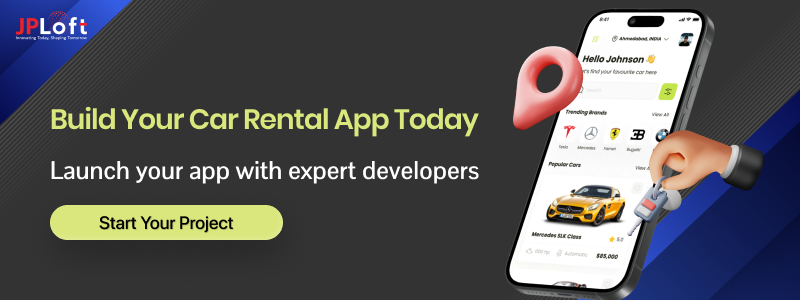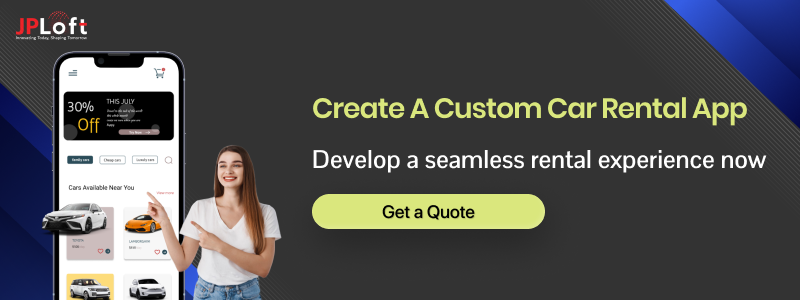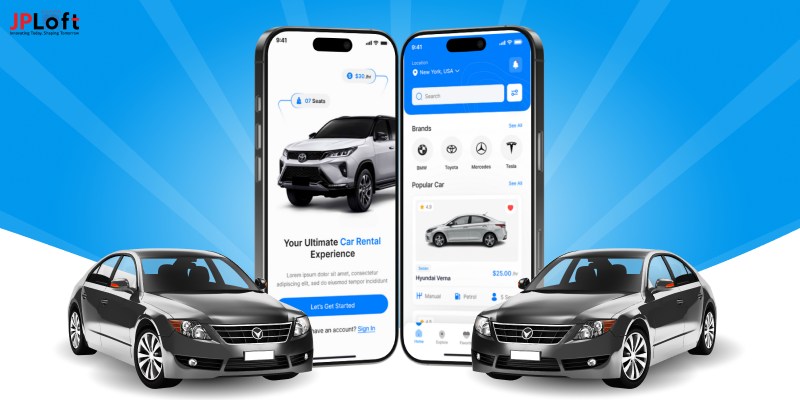The car rental industry is shifting into high gear!
As per Grand View Research, with a projected market value exceeding USD 278 billion by 2030, now is the perfect time to seize this lucrative opportunity.
Imagine owning your own thriving car rental business, where technology empowers you to streamline operations, enhance customer experiences, and unlock unprecedented profitability.
With the right strategy and tools, you can tap into this growing market and make your mark in the industry.
If you are stuck with "How do I start a car rental business?" then this guide is the best for you, as this will provide you the actionable insights you need to conquer this dynamic landscape and build a successful car rental empire.
Understanding the Car Rental Market
The car rental market is experiencing rapid growth. According to SnS Insider reports, the global market size is projected to reach a staggering USD 311.63 billion by 2031, exhibiting a compound growth rate (CAGR) of 11.5% from 2024 to 2031.
This presents a significant opportunity for entrepreneurs looking to tap into this expanding market.
Several factors are contributing to this growth:
- Both business and leisure travel are on the rise, creating a higher demand for rental vehicles.
- With global tourism expanding, there’s a need for more transportation options for travelers.
- Platforms like Turo have disrupted traditional rental models, offering more flexible and affordable solutions.
Types of Car Rental Services
The car rental industry offers a wide range of services to meet the needs of different customers. Here's a breakdown of the most common types:
|
Service Type |
Description |
Ideal For |
|
Daily Rentals |
Short-term vehicle rentals range from a few hours to several days. |
Tourists, business travelers, or anyone needing temporary transportation. |
|
Long-Term Rentals |
Rentals lasting for a month or more. |
Corporate clients, expatriates, or those needing a vehicle for an extended period. |
|
Peer-to-Peer (P2P) Rentals |
Platforms like Turo connect car owners with renters. |
Budget-conscious travelers or those seeking unique or specialty vehicles. |
► Case Study Examples
To understand the evolving car rental landscape, let's compare two key players in the market: Hertz and Turo.
|
Aspect |
Hertz |
Turo |
|
Business Model |
Traditional car rental agency with a vast fleet. |
Peer-to-peer car rental platform. |
|
Target Audience |
Corporate clients, tourists, and leisure travelers. |
Travelers looking for flexible, affordable options. |
|
Market Reach |
The global network of rental locations. |
Operating in over 5,000 cities internationally. |
|
Fleet Options |
Economy to luxury vehicles, plus specialty cars. |
Wide range of vehicles, including luxury, classic, and electric models. |
Hertz represents the traditional car rental model, with a broad market reach and a focus on customer loyalty programs and technology integration.
On the other hand, Turo is revolutionizing the industry with a peer-to-peer model, offering unique car rental experiences while providing more flexibility and affordable pricing for users.
Why Should You Start a Car Rental Business?
Starting a car rental business can be a truly rewarding venture. The car rental market is experiencing really good growth, creating a high demand for rental options.
This presents a fantastic opportunity for entrepreneurs looking to capitalize on this thriving industry.
Here's why:
-
- High Demand, Big Potential: The travel industry is booming, and with it comes a constant need for transportation. This translates to a steady stream of customers seeking reliable and convenient rental services.
This high demand within the car rental market creates a significant opportunity for car rental businesses to thrive.
-
- Consistent Income Stream: Rental fees provide a predictable and recurring revenue stream, making it easier to plan for expenses and reinvest in your business growth. This contributes significantly to the profitability of a well-run car rental business.
- Scalability: You don't need to start with a massive fleet. Begin with a few vehicles and strategically expand as your customer base grows. This scalability allows you to manage your investment and minimize risk while maximizing potential returns.
- Flexibility and Customization: The beauty of this business is its adaptability. You can cater to specific niches, such as:
- Luxury Car Rentals: Focusing on high-end vehicles for special occasions or discerning travelers.
- Airport Rentals: Conveniently located near airports to capture the travel market.
- Specialized Rentals: Offering unique vehicles like trucks, vans, or even recreational vehicles (RVs) to cater to specific needs.
By carefully analyzing your local market, identifying your target audience, and providing excellent customer service, you can build a successful and profitable car rental business.
Steps to Get Started With Your Car Rental Business
Starting a car rental business is a great opportunity for someone looking to enter the travel and transportation industry.
With the rise of app-based solutions and changing consumer preferences, launching a car rental business is more accessible than ever.
Here are the steps that can help you get started.
Step 1: Choosing the Right Business Model
The first step when you start a car rental business is to select the right business model. This decision will influence your operations, investment, and overall strategy.
-
-
Fleet-Based Model: In the fleet-based model, you own and manage a fleet of vehicles for customers to rent. This requires a significant upfront investment in purchasing vehicles and managing maintenance.
-
A car rental app can simplify bookings, payments, and fleet management.
-
- Peer-to-Peer (P2P) Model: The P2P model allows individuals to rent their personal vehicles through a platform you manage. This model reduces upfront costs as you don’t own the cars but instead facilitate rentals. Sometimes people build apps like Turo and use this model to compete in the market.
- Hybrid Model: A hybrid model combines elements of both fleet-based and P2P models. You maintain a small fleet of vehicles but also allow car owners to list their vehicles on your platform.
Step 2: Know Your Market
Understanding your target audience is essential to developing a successful business plan.
-
-
Identify Target Customers: Tourists, business travelers, and millennials are key customer groups for car rental businesses. Tourists often require short-term rentals, while business travelers may need vehicles for longer durations.
-
Millennials are particularly drawn to car rental apps that offer flexibility and convenience.
-
-
Fleet and Location Considerations: Your location matters—places like airports, business centers, or tourist destinations are prime spots. The size of your fleet will depend on demand, with options ranging from economy cars to luxury vehicles and electric cars.
-
Step 3: Understand Initial Investment
Getting your car rental business up and running involves several financial considerations.
-
- Vehicle Acquisition: Investing in a fleet of vehicles is a large portion of your initial costs. Whether buying or leasing, vehicles should be reliable, well-maintained, and in demand.
- Insurance and Maintenance: Insurance coverage for your fleet is crucial for protecting against accidents or theft. Regular maintenance of the vehicles is also necessary to ensure a smooth experience for customers.
- Technology: A mobile app is a must for modern car rental businesses. Your app should support booking, payments, and fleet management to ensure convenience for both customers and your team.
Step 4: Legal and Regulatory Requirements
Every person thinking of starting a car rental business has a common question: “What are the legal requirements to operate a car rental business?”
which is very important as you need to ensure compliance with local regulations when launching your business.
-
- Licensing and Permits: You’ll need proper licenses and permits to operate a car rental service. This includes vehicle registration, business licensing, and any local operating permits required for rentals.
- Insurance Coverage: Ensure you have the appropriate insurance coverage to protect both your fleet and your customers. This typically includes liability insurance and comprehensive vehicle insurance.
Step 5: Build a Digital Backbone
A robust tech infrastructure is crucial to running an efficient car rental business.
- Mobile App: Developing an easy-to-use car rental app is key for providing a seamless customer experience. It allows users to book vehicles, make payments, and manage their rentals all from their phones.
- Payment and Booking Systems: Integrate secure payment gateways into your app to enable smooth and safe transactions. An intuitive booking system will ensure customer satisfaction and improve your conversion rates.
By selecting the right model, conducting thorough market research, securing the necessary investments, and ensuring legal compliance, you can successfully start a car rental business.
With the right tools and strategies in place, your business can thrive in the growing demand for flexible, on-demand transportation.
How Technology Transforms Your Car Rental Business
In today’s competitive market, leveraging technology is essential to running an efficient, profitable, and customer-friendly car rental business. Here’s how modern tech can streamline your operations.
► Automate Bookings & Payments: Save Time, Boost Efficiency
When you develop a mobile app for your business, automating the booking and payment processes is vital. Automation reduces administrative tasks, prevents manual errors, and provides customers with a seamless experience.
By offering easy online booking and payment options, you can save time and focus on scaling your business.
► Contactless Solutions: A Must for Modern Customers
Modern customers expect convenience and security. Mobile solutions and contactless transactions are essential to meet these demands.
Allowing customers to book, pay, and manage rentals through their smartphones not only enhances their experience but also helps your car rental business stay competitive in a changing market.
► Leverage Data Analytics: Optimize Pricing & Fleet Management
Integrating data analytics into your operations helps optimize pricing and improve fleet management
This is particularly important when considering the as it will significantly impact your ability to streamline operations and maximize profitability.
► Technology Costs for Your Car Rental Business
|
Technology |
Estimated Cost to Implement |
Impact on Business Operations |
|
Mobile App Development |
$30,000 - $150,000+ |
Streamline bookings, payments, and fleet management. Critical for business growth. |
|
Contactless Payment Solutions |
$2,000 - $10,000+ |
Enhances customer experience by enabling fast, secure payments. |
|
Data Analytics Tools |
$5,000 - $25,000+ |
Helps optimize pricing and fleet utilization, improving profitability. |
|
Fleet Management Software |
$3,000 - $15,000+ |
Improves fleet tracking and maintenance scheduling, reducing operational costs. |
How to Market Your Car Rental Business?
A solid marketing strategy is essential to attract and retain customers in today’s competitive market.
1] Partnerships & Collaborations
Team up with hotels, airlines, and travel agencies to create bundled offers. These partnerships can significantly boost your visibility and bring in new customers.
2] Build an Online Presence
Your website and social media are your storefronts in the digital age. Optimize your website for SEO to rank higher in search results and make it mobile-friendly.
A professional, user-friendly mobile app, which factors into the cost to develop a car rental app, is also essential to streamline bookings and payments.
You'll need to hire dedicated developers to assist with both website and app development, helping you expand your target audience reach.
3] Customer Loyalty Programs
Reward repeat customers with discounts, freebies, or exclusive perks. This not only encourages loyalty but also increases lifetime customer value.
Quick Tips for Aspiring Car Rental Entrepreneurs
Here’s a breakdown of essential tips to help you succeed in the growing car rental industry.
1. Understanding the Market Demand: What’s Driving Growth?
-
- Stay Updated on Travel Trends: Monitor tourism growth and urban mobility needs. Focus on high-demand areas and partner with local businesses to tap into lucrative markets.
- Appeal to Millennials and Gen Z: These generations prioritize convenience and affordability. Offer flexible terms, easy app navigation, and value-added services like eco-friendly vehicles or loyalty programs.
2. Breaking Into the Market: What You Need to Know
-
- Find Your Niche: Analyze competitors and identify gaps in the market. Consider offering unique options such as luxury rentals, electric vehicles, or innovative pricing structures.
- Choose the Right Model: Decide between a fleet-based setup or a peer-to-peer model. The latter requires less capital and is easier to scale.
3. Legal and Operational Basics You Need
-
- Cover All Legal Requirements: Secure licenses, permits, and vehicle registrations to ensure smooth operations. Consult with legal experts to avoid potential pitfalls.
- Provide Robust Insurance: Offer protection plans to safeguard your assets and give customers peace of mind. Look for customizable insurance options to suit your business model.
4. The Role of Technology: How to Keep Customers Happy
-
- Build an Intuitive App: Invest in a mobile app that simplifies bookings and payments. Include features like real-time availability, booking history, and support for a seamless experience.
- Go Contactless: Enable digital payments, self-check-ins, and keyless access to vehicles. These conveniences enhance customer satisfaction and reduce operational challenges.
5. Making Money: How to Maximize Revenue
-
- Offer Flexible Rental Plans: Provide both short-term and long-term rental options to cater to different needs. Offer discounts for extended bookings to encourage repeat customers.
- Upsell Add-On Services: Boost earnings by offering extras such as GPS devices, child seats, or premium insurance plans. Promote these during the booking process.
6. Keeping Things Green: Sustainability and Smart Fleet Management
-
- Incorporate Electric Vehicles: Attract eco-conscious customers by adding electric vehicles (EVs) to your fleet. Highlight their environmental benefits in your marketing campaigns.
- Prioritize Maintenance: Regular servicing of vehicles minimizes breakdowns and ensures customer satisfaction. Use fleet management tools to streamline maintenance schedules.
7. Additional Quick Tips to Get Started
-
- Collaborate Locally: Partner with hotels, travel agencies, and event planners to expand your reach and attract more customers.
- Start Small: Test the waters with a limited fleet or a peer-to-peer model to minimize upfront investment.
- Use Analytics: Leverage data to predict demand, optimize pricing, and improve fleet utilization.
By following these tips, you can navigate the car rental market with confidence and build a successful, customer-centric business.
How Do Car Rental Businesses Make Money?
Car rental businesses generate revenue through various streams, ensuring profitability by offering flexible rental options, additional services, and efficient fleet management.
Here’s how they make money:
A] Short-Term vs. Long-Term Rentals
Car rental companies make money by offering both short-term and long-term rental options. Short-term rentals, often targeted at tourists, are priced higher on a daily basis but have quick turnover.
B] Add-Ons and Upselling
One of the most profitable revenue streams is offering add-ons and upselling services. Extras like GPS navigation, child seats, car insurance, and vehicle upgrades can significantly boost a car rental company's earnings.
C] Fleet Optimization
By strategically managing their fleet, car rental businesses ensure their vehicles are rented out as much as possible while minimizing downtime.
Data-driven insights into rental patterns, customer demand, and fleet performance help rental companies adjust their fleet size and vehicle types to maximize revenue.
D] Leasing Vehicles
Some car rental businesses also make money by leasing out their vehicles to other companies or individuals.
By renting out their fleet to third-party agencies or providing vehicles to ride-sharing platforms, they earn additional income without direct customer interaction.
E] Location-Based Pricing
Car rental businesses also make money through location-based pricing. They may charge higher rates in busy tourist destinations, airports, or cities while offering lower rates in suburban or rural areas.
Understanding the Cost to Start a Car Rental Business
Launching a car rental business requires careful financial planning to ensure a solid foundation, including the cost to develop a car rental app to understand the overall expenses and streamline operations.
Below is a detailed breakdown of potential costs:
|
Expense Category |
Details |
Estimated Cost |
|
Vehicle Acquisition |
Purchase or lease of vehicles for your fleet |
$20,000–$40,000 per vehicle |
|
Insurance |
Comprehensive coverage for your fleet |
$1,000-$3,000 per vehicle annually |
|
Mobile App Development |
App for bookings, payments, and management |
$30,000–$150,000 |
|
Website Development |
Professional, SEO-optimized website |
$5,000–$15,000 |
|
GPS and Tracking Systems |
Real-time tracking for fleet vehicles |
$2,000–$5,000 per device |
|
EV Charging Infrastructure |
For electric vehicles in your fleet |
$10,000–$50,000 |
|
Marketing |
Digital ads, SEO, and social media campaigns |
$2,000–$10,000 per month |
|
Licensing and Permits |
Required for legal operation |
$1,000–$5,000 |
|
Operational Costs |
Maintenance, fuel, office space, and staffing |
$10,000–$50,000 monthly |
Understanding these costs can help you plan effectively and ensure that your business is well-prepared to meet both customer expectations and operational demands.
How JPLoft Can Be Your Go-To Partner for Car Rental Business?
At JPLoft, we understand the intricacies of starting and scaling a car rental business. With years of experience, we specialize in providing tailored solutions to meet your unique needs.
From creating feature-rich mobile apps to developing secure web platforms, we ensure that your business operations are seamless and efficient.
As a leading car rental app development company, JPLoft offers end-to-end services, including app design, development, deployment, and post-launch support.
If you are stuck with “how to market a car rental business online” or “how do I attract customers to my car rental?” then worry not, as we can provide expert guidance and provide you with the best marketing techniques.
Partnering with JPLoft means you’ll have access to a team dedicated to turning your vision into reality. Whether you’re targeting local or international markets, we’ll help you stay ahead in the competitive car rental industry.
Ready to elevate your business? Let’s build something extraordinary together.
Wrapping Up
Partnering with the right experts can make all the difference when starting or scaling your car rental business. A reliable development partner can help you create a seamless platform that caters to customer needs while streamlining operations.
From automated bookings to secure payment gateways, the right technology ensures efficiency and enhances customer satisfaction.
With advanced features like real-time tracking and fleet optimization, your business can stay competitive and profitable.
Whether you’re launching a new venture or expanding an existing one, leveraging expertise and cutting-edge solutions is the key to achieving long-term success in the car rental industry.
FAQs
Yes, with the right approach, a car rental business can be highly profitable, especially if you're operating in high-demand areas. By focusing on customer service, fleet management, and pricing strategies, you can create a steady stream of income.
Starting a car rental business can cost $30,000 to $250,000, covering vehicles, insurance, tech, maintenance, and marketing.
It typically takes 6 to 12 months to start seeing a profit, depending on your location, fleet size, and marketing efforts. Properly managing overhead costs and booking volumes will help accelerate profitability.
Success depends on choosing the right fleet, understanding customer demand, leveraging technology for ease of booking and payments, and maintaining a strong online presence. Offering excellent customer service and differentiating your business also helps.
You'll need to acquire proper licenses, permits, and insurance, and follow local regulations. It's important to ensure that your fleet meets safety standards and you have the correct legal protections to operate smoothly.















Share this blog